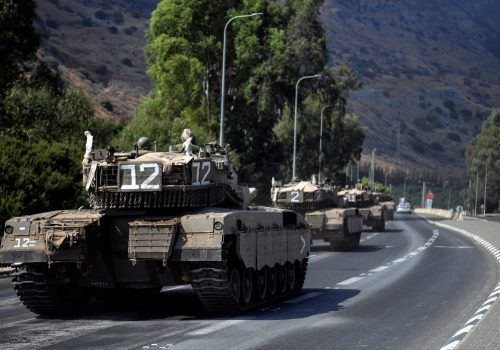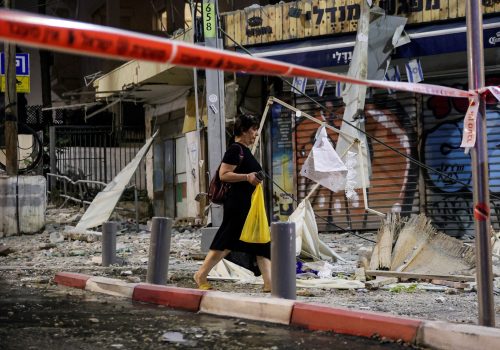Dispatch from Abu Dhabi: Do the Israelis know about the Basus War?
ABU DHABI—My route out of Israel in the days after Hamas’s terrorist attack drew the country into war took me from Tel Aviv to Jerusalem to Abu Dhabi, where I had the opportunity last week to speak with senior government officials about the unfolding war. (In the interest of disclosure: The Emirati government is a donor to the Atlantic Council.)
Here are my reflections on those conversations.
Paying the price for denouncing Hamas
The government of the United Arab Emirates (UAE) has great sympathy for the Palestinian people, but it is clear-eyed about Hamas, which it has long recognized to be a terrorist organization. Therefore, it was unsurprising that the UAE, joined by its Abraham Accords partner Bahrain, would issue the Arab world’s strongest condemnations of Hamas soon after October 7. They referred to Hamas’s escalation as “serious and grave” or “dangerous” for the region, and the UAE specifically noted that it was “appalled” by Hamas taking Israeli citizens as hostages, while Bahrain issued a “denunciation” of the kidnappings. In contrast, their neighbor Qatar declared “Israel alone is responsible for the current escalation”—a view that is sadly much more representative of the Arab street. And given how vocal the UAE has been in promoting the Abraham Accords over the last three years, the government feels especially exposed and vulnerable to shifts in Arab public opinion now.
A senior government official here told me that they were proud of that statement—the feeling I heard from many here was that it was the right thing to do. That said, they also knew in advance that the cost for positioning the UAE as “a voice of reason”—another phrase I heard repeated several times—would not be cheap. And in both domestic and pan-Arab social media the country is paying that price today. At the same time, UAE officials have also made clear that economic ties between Emiratis and Israelis would continue despite the coming war and that, as Emirati Minister of State for Foreign Trade Thani bin Ahmed Al Zeyoudi put it, “We don’t mix the economy and trade with politics.”
Privately, many here will be hoping that Israel successfully eliminates Hamas and does so especially rapidly, before Arab public sentiment becomes unmanageable.
Israel should anticipate that these statements will likely represent the zenith of the open support it will receive from the UAE during the war. Publicly, the UAE will now stress three themes going forward: working toward a de-escalation of the conflict, with Egypt likely playing a key role; advocating for the return of the hostages, with Qatar seeking to influence Hamas; and providing humanitarian support to the Palestinian people, an area of focus for the UAE and for President Mohamed bin Zayed personally, having already directed twenty million dollars in assistance. Future Emirati diplomacy is therefore less likely to include anti-Hamas rhetoric and will more likely track the recent joint statement from the Gulf Cooperation Council and the European Union, which called for “restraint.” And we have since seen the result of this shift, with the UAE, Bahrain, and Saudi Arabia each quickly putting our statements blaming Israel for the recent strike on a hospital in Gaza.
Privately, many here will be hoping that Israel successfully eliminates Hamas and does so especially rapidly, before Arab public sentiment becomes unmanageable. There is a palpable concern, however, that Hamas will prove to be a stronger adversary than expected, resulting in a prolonged Israeli war against an unending insurgency that is protected by an extensive network of secret tunnels.
Some officials with whom I spoke suggested that Israel might be forced to negotiate a ceasefire with Hamas sooner than it thinks. I find this scenario to be unrealistic, however, especially in the near term. The Israeli public is in no mood to compromise, just as the United States was in no mood to compromise with al-Qaeda after 9/11. Emiratis should be able to understand the emotions at play; after all, from Mohammed bin Zayed down they were profoundly impacted by the January 2022 Houthi attack on Abu Dhabi, an event they’ve repeatedly referred to as “our 9/11.” Any potential future setbacks in Israel’s war against Hamas are more likely to be met with surges to double down on the fight rather than with negotiations to end it.
Three worrying scenarios
Even if Israel prevails relatively rapidly against Hamas, UAE officials are concerned with three other scenarios. First, that Hezbollah opens up a northern front, which could then quickly spread to Syria and to Iran and even involve the United States—which would potentially put the UAE on the front lines as well. Everyone recognizes that if one missile or drone from Iran hits one skyscraper in Dubai, most foreign nationals here will immediately head for the door and the UAE’s non-oil economy would collapse. The UAE has thus been part of the tidal wave of diplomacy throughout the region over the last week to send warnings to Iran and its allies. I came away from these discussions thinking that if it’s not doing so already, the Biden administration should work with the UAE on joint contingency plans to respond immediately if the Houthis, at Iran’s urging, once again target the UAE.
The second scenario of serious concern is the possibility that Arab populations, increasingly enraged by videos of suffering Palestinians in Gaza and mobilized by actors such as the Muslim Brotherhood, will expand their protests, eventually start rioting, and potentially pose a threat to the stability of countries such as Egypt and Jordan—key security partners for Israel. This scenario is hardly far-fetched. An uprising toppled the Egyptian government in 2011, ushering in an elected Muslim Brotherhood government there until a second round of popular protests led to the military coup in 2013—and Abu Dhabi is decidedly not eager for a replay. Furthermore, officials recall how Palestinian organizations previously threatened the regime in Jordan in 1970 and then contributed to the Lebanese civil war later that decade. Egypt is already engaged in a counterterrorism campaign in the Sinai, so there will be no appetite for Egypt to bring two million Gazans into their territory who might later threaten Cairo.
The third concern derives from the uncertainty that prevails around Israeli plans for Gaza after a victory over Hamas, a subject I discussed on in my previous Dispatch from Jerusalem. UAE officials I spoke to were hopeful that Israel might soon provide public assurances that, after Hamas has been completely routed, innocent Palestinians will be allowed back to areas they have fled, humanitarian funds from places such as the UAE will be welcome, and the restrictions Israel imposed on Gaza after Hamas violently took power in 2007 will be largely reversed.
The alternative is a scenario in which Israel, solely motivated by an understandable desire for vengeance against Hamas, ends up taking actions that eventually drive away its new Arab friends. One Emirati official asked me if Israelis were familiar with the story of the Basus War. When I expressed my own ignorance, he explained that over one hundred years before the founding of Islam, a war between two tribes in Arabia was initially sparked by the killing of a camel, but through an escalating cycle of vengeance, lasted for forty years and brought great devastation. In the end, those who focused only on vengeance found themselves alone, their friends having been forced to abandon them.
William F. Wechsler is the senior director of Middle East Programs at the Atlantic Council. His most recent US government position was deputy assistant secretary of defense for special operations and combatting terrorism.
Further reading
Sun, Oct 8, 2023
Dispatch from Jerusalem: How does this end?
New Atlanticist By William F. Wechsler
Israel must not make the same mistakes that the United States made after 9/11. Here are some critical questions to ask now.
Sat, Oct 7, 2023
Dispatch from Tel Aviv: A new kind of conflict has begun
New Atlanticist By William F. Wechsler
The international community cannot reflexively repeat the threadbare slogans that have accompanied previous cycles of Israel-Hamas clashes.
Mon, Oct 16, 2023
Live expertise: The latest insight as Israel prepares for a ground invasion of Gaza
New Atlanticist By
Atlantic Council experts are analyzing the Israel-Hamas conflict as it enters its second week.
Image: US Secretary of State Antony Blinken tours the Imam Al-Tayeb Mosque at the Abrahamic Family House, in Abu Dhabi, United Arab Emirates, Saturday October 14, 2023. Jacquelyn Martin/Pool via REUTERS


